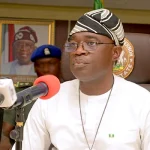The Federal Government has been compelled to reimburse the Nigerian National Petroleum Company Limited N4.71 trillion in order to settle outstanding obligations related to the importation of Premium Motor Spirit, also known as petrol, into the nation.
Under “Exchange rate differential on PMS and other joint venture taxes,” the claim was made for petrol products that the business imported between August 2023 and June 2024.
At the June meeting of the Federation Accounts Allocation Committee, this was revealed by Wale Edun, the Coordinating Minister of the Economy and the Minister of Finance.
Exchange rate differentials are the profits earned by banks or government organisations from the variation in value of two currencies at various points in time as a result of the selling and purchase of foreign exchange.
The difference in the two rates, for instance, if you exchange one US dollar for 0.9 euros today and obtain $1 for 0.8 euros tomorrow, is known as the exchange rate disparity.
Due to this development, gasoline imports will also be supported by the government, which will pay the difference between the anticipated rate and the actual costs spent by the NNPC while bringing petroleum goods into the nation.
The government’s assertions that subsidies have been withdrawn are refuted by this cost differential, which typically should be passed on to ultimate customers and reflected in the product’s retail price.
This disclosure also occurs in the midst of the petroleum company’s struggles to guarantee that marketers have a sufficient supply of PMS for distribution across the country.
Speaking at the meeting, the minister informed the state finance commissioners that the national oil corporation was authorised by the president to perform this job from October 2023 to March 2024 using the “Weighted Average Rate.”
Edun continued, saying that the business had also asked for a longer time frame to cover the differential rate, but that they had been told to submit a request in writing to the National Economic Council for approval.
The minutes read, “NNPC Limited Exchange Rate Differentials on PMS Importation and Other Joint Venture Taxes for the period August 2023 to April 2024.
“The chairman, PMSC (Post Mortem Sub-Committee) reported that NNPC Limited informed the sub-committee that it had an outstanding claim of N2,689,898,039,105.53 against the federation as a result of the use of ‘Weighted Average Rate’ as of May 2024.
“Furthermore, he disclosed that the sub-committee was able to establish that there was Presidential approval to use the ‘Weighted Average Rate’ from October 2023 to March 2024.”
According to information obtained, starting in June 2023, the NNPC was authorised by the government via the National Economic Council to import fuel at a retail coastal pump price of N650 to $1. However, the depreciation of the naira caused the price to increase to N1,200, indicating a N550 exchange difference.
President Bola Tinubu officially proclaimed during his inauguration on May 29, 2023, that “subsidy is gone,” indicating the removal of obstacles preventing the country’s economic growth.
The World Bank, the International Monetary Fund, and other respected organisations, on the other hand, dispute this assertion, claiming that the government has covertly reinstated fuel subsidies.
According to a June draft of the economic stabilisation plan paper, the government intended to spend over N5.4 trillion on fuel subsidies.
Additionally, oil marketers said that the monthly subsidy on PMS had increased to around N707 billion, given its landing cost of ₦1,117 per litre.
Linus Nkan, the commissioner of finance for Akwa Ibom State, commented and asked for more information regarding the origins of the N2.6 trillion exchange rate differentials versus the federation.
“The Commissioner of Finance, Akwa Ibom State, referred to paragraphs 3.01 and 5.01 of the PMSC report and requested clarifications as to how the N2.6tn exchange rate differentials against the Federation came about,” the minute said.
In response, Joshua Danjuma, General Manager of the FAAC office at the NNPCL, stated that the sum that the corporation had claimed was intended to pay for PMS landing costs.
He continued by saying that by May 2024, costs had also gone up dramatically as a result of exchange rate fluctuations.
He said, “Reacting to the issue of the N2.6tn claim of NNPC Ltd against the Federation, the representative of NNPC Limited confirmed that the figure had increased significantly as of May 2024 due to the change in the rate at which the company was sourcing for the Forex to pay for the landing cost of PMS.”
This was confirmed by another document that The PUNCH was able to secure, which stated that as of June 2024, the figure had climbed to N4.71tn.
The debt, which had an outstanding amount of N1.18 trillion, grew to N1.24 trillion in August 2023, N1.3 trillion in September 2023, and N1.51 trillion in October 2023, according to a month-by-month breakdown.
These claims grew by N570 billion to N2.08 trillion by November and by an additional N550 billion to N2.63 trillion by December 2023.
According to the document, the sum went up to N3.19 trillion in January 2024, N3.29 trillion in February, N3.55 trillion in March, N4.02 trillion in April, N4.29 trillion in May, and N4.71 trillion in June 2024.
The reason for the rate difference was also disclosed by Mohammed Bello, Chairman of the Revenue Mobilisation Allocation and Fiscal Commission, in a presentation given during the meeting.
He stated, “NNPCL made the necessary pricing adjustments using an exchange rate benchmark of N650 to 1 US Dollar to arrive at retail coastal pump prices from June 2023 following the removal of subsidy on PMS on May 29, 2023.”
“Furthermore, NNPCL sought and obtained approval of His Excellency, Mr. President, for the freezing of the Proforma Invoice Ex-coastal transfer price at N524.99 from August 2023 to March 31st 2024, using exchange rate modulation to sustain the supply of petroleum products and ensure National Energy Security.
“NNPCL equally reported that the Company had obtained another approval to extend the use of the weighted Average Rate from April to June 2024, though the Sub-Committee is yet to see the document. As of June 2024, NNPCL reported the outstanding against the Federation in respect of the exchange rate differential.
“The Sub-Committee also observed from NNPCL June 2024 report to FAAC that the weighted average exchange rate for the month was N1,200, which they said was the estimated rate as against the N650 that was sought for in the NEC extract.
“It was also observed from the analysis that the volume, price and sales value were not provided to justify the exchange rate differential recorded.
“NNPCL responded that additional information could be provided to the Sub-Committee to clarify the issues raised but based on request. The Chairman of the Commission, who chaired the meeting, agreed to write to NNPCL requesting the relevant information to resolve the issue.”
Lawal Maikano, the Niger State Commissioner for Finance, bemoaned the insufficiency of income-generating entities in meeting the state’s revenue objective, emphasising that only half of the money allocated for the current year has been realised.
“The HCF, Niger State referred to the Communique and observed that only about 50 per cent of the budgeted revenue for the current year was being achieved by the RGAs and described it as a poor budget performance.”
As a result, he repeatedly emphasised the necessity of changing the FAAC revenue budget estimate to a sum that the RGAs could actually attain.




